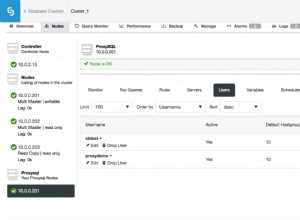Você deve mesclar elementos não aninhados usando
jsonb_each() para ambos os valores. Fazer isso em uma consulta não trivial pode ser desconfortável, então eu preferiria uma função personalizada como esta:create or replace function jsonb_my_merge(a jsonb, b jsonb)
returns jsonb language sql as $$
select
jsonb_object_agg(
coalesce(ka, kb),
case
when va isnull then vb
when vb isnull then va
else va || vb
end
)
from jsonb_each(a) e1(ka, va)
full join jsonb_each(b) e2(kb, vb) on ka = kb
$$;
Usar:
select jsonb_my_merge(
'{"a":{"b":2}, "d": {"e": 10}, "x": 1}'::jsonb,
'{"a":{"c":3}, "d": {"f": 11}, "y": 2}'::jsonb
)
jsonb_my_merge
------------------------------------------------------------------
{"a": {"b": 2, "c": 3}, "d": {"e": 10, "f": 11}, "x": 1, "y": 2}
(1 row)
Você pode modificar ligeiramente a função usando recursão para obter uma solução que funcione em qualquer nível de aninhamento:
create or replace function jsonb_recursive_merge(a jsonb, b jsonb)
returns jsonb language sql as $$
select
jsonb_object_agg(
coalesce(ka, kb),
case
when va isnull then vb
when vb isnull then va
when jsonb_typeof(va) <> 'object' then va || vb
else jsonb_recursive_merge(va, vb)
end
)
from jsonb_each(a) e1(ka, va)
full join jsonb_each(b) e2(kb, vb) on ka = kb
$$;
Exemplos:
select jsonb_recursive_merge(
'{"a":{"b":{"c":3},"x":5}}'::jsonb,
'{"a":{"b":{"d":4},"y":6}}'::jsonb);
jsonb_recursive_merge
------------------------------------------------
{"a": {"b": {"c": 3, "d": 4}, "x": 5, "y": 6}}
(1 row)
select jsonb_recursive_merge(
'{"a":{"b":{"c":{"d":{"e":1}}}}}'::jsonb,
'{"a":{"b":{"c":{"d":{"f":2}}}}}'::jsonb)
jsonb_recursive_merge
----------------------------------------------
{"a": {"b": {"c": {"d": {"e": 1, "f": 2}}}}}
(1 row)
Por fim, a variante da função com as alterações propostas pelo OP (ver comentários abaixo):
create or replace function jsonb_recursive_merge(a jsonb, b jsonb)
returns jsonb language sql as $$
select
jsonb_object_agg(
coalesce(ka, kb),
case
when va isnull then vb
when vb isnull then va
when jsonb_typeof(va) <> 'object' or jsonb_typeof(vb) <> 'object' then vb
else jsonb_recursive_merge(va, vb) end
)
from jsonb_each(a) e1(ka, va)
full join jsonb_each(b) e2(kb, vb) on ka = kb
$$;




